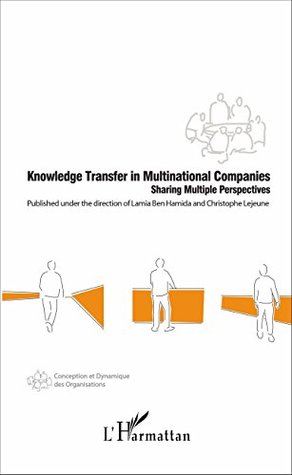Read online Knowledge Transfer in Multinational Companies: Sharing Multiple Perspectives (Conception et dynamique des organisations) - Lamia Ben Hamida | PDF
Related searches:
11 dec 2018 an ethos of knowledge transfer, implementation and learning are needed for international business success.
This paper focuses on the internal network of multinational companies. ( mnc) and aims to investigate the role of information systems.
By disaggregating the role of knowledge transfer across management functions, directions of knowledge transfer, and type of international assignees, we find that (1) expatriate presence generally increases function‐specific knowledge transfer from and, to a lesser extent, to headquarters; and that (2) the relevance of expatriates and former inpatriates varies for knowledge flows between headquarters and subsidiaries.
This book shifts the debate on knowledge transfers within multinational corporations (mncs) back to its core: how can we increase the effectiveness.
Knowledge management knowledge transfer multinational corporation external knowledge cultural distance these keywords were added by machine and not by the authors. This process is experimental and the keywords may be updated as the learning algorithm improves. This is a preview of subscription content, log in to check access.
Knowledge transfer in multinational companies: sharing multiple perspectives ( conception et dynamique des organisations) (french edition) [ben hamida,.
Managing knowledge transfer in mncs: the impact of headquarters control mechanisms, journal of international.
This master s thesis will look at the cross-cultural transfer of knowledge between teams in the norwegian company powel, and seek to explore how team culture.
Knowledge transfer in multinational firms� knowledge management is a key factor to the success of multinational firms. Many times in fact it is reverse knowledge transfer that gives the firm competitive advantage in its particular industry.
Multinational organizations are global knowledge transfer systems where multiple knowledge flows happen simultaneously between hq, local clusters, and subsidiaries. Hqs are irreplaceable sources of knowledge for the subsidiaries, since they possess valuable intangible assets and capabilities, used in the local markets.
Viewing knowledge as rooted in individuals, this study investigates knowledge transfer in multinational corporations (mncs) from an individual-level perspective.
13 jan 2016 abstract and key results ▫ this paper develops and tests a model that analyzes the joint effect of four determinants of knowledge transfer.
Knowledge transfer in multinational companies: sharing multiple perspectives (conception et dynamique des organisations) (french edition) [ben hamida, lamia, lejeune, christophe] on amazon.
And reverse knowledge transfer (rkt) in multinational companies (mncs). Intelligence as promoter of knowledge transfer in multinational companies.
11 nov 2019 knowledge characteristics affect knowledge flow in mncs, often in conjunction with other factors, including the transfer context.
For this purpose, we define knowledge transfer in a broad manner, including the processes of knowledge creation, shar-ing, and use within an mnc and its various parts. To examine the effects of language-sensitive recmitment on knowledge transfer, we conducted a mixed-method study on mnc subsidiaries in japan.
The paper first analyses some of the critical issues of knowledge transfer at multinational companies, based on international human resource management.
In organizational theory, knowledge transfer is the practical problem of transferring knowledge from one part of the organization to another. Like knowledge management, knowledge transfer seeks to organize, create, capture or distribute knowledge and ensure its availability for future users.
Abstract: transferring knowledge globally is thought to lead to competitive advantage of multinational companies.
27 may 2011 key words: knowledge transfer, mncs, subsidiary, performance, communication.
We assess knowledge transfer performance along two dimensions: utilization of transferred knowledge and transfer cost. We argue that the substitutive versus complementary nature of subunits' activities is a key determinant of knowledge utilization at the target subunit.
A growing interest in the various aspects of knowledge transfer within multinational corporations has been evidenced by a recent surge in empirical research.
Viewing knowledge as rooted in individuals, this study investigates knowledge transfer in multinational corporations (mncs) from an individual‐level perspective.
4 dec 2020 pdf this paper focuses on the multifaceted role of language and language- sensitive recruitment in knowledge transfer in multinational.
This paper aims to look at the issue of culture's role in knowledge transfer within multinational corporations (mncs). Studies of mncs have hinted at the importance of culture to the performance of subsidiaries.

Post Your Comments: